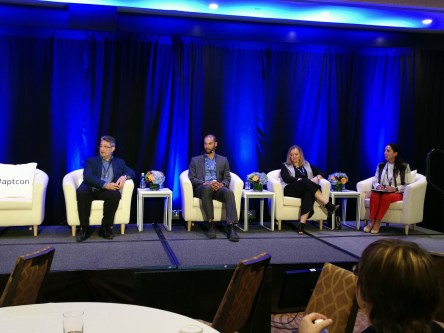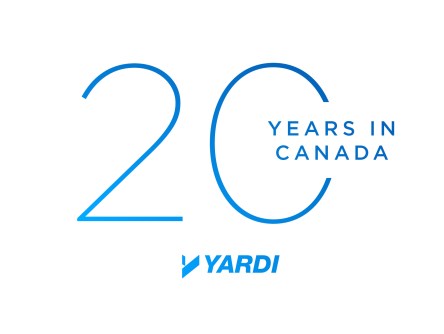For most kids, growing up is riddled with lessons in how to be a good follower. Follow the rules at home. Follow directions at school. Follow the norms of the community in which we live. Youth leadership, however, is widely accepted as a means of instilling responsibility, positive self-image and motivation in kids. Youth Empowering Parents reverses the mentorship dynamic to help kids uncover the leader within. Yardi caught up with Agazi Afewerki, co-founder and executive director of the nonprofit, to learn more about its successful and innovative programs. Millennial Style Agazi co-founded Youth Empowering Parents with his friend in classic . They saw two needs in their Regent Park, Toronto community: adults without access to professional development resources and kids without access to meaningful leadership opportunities. They looked around for support, but they didn’t find what they needed. They then proceeded to spearhead the nonprofit themselves. Learning along the way would be part of the business plan. “It’s how I and a lot of other kids grew up,” says Agazi. “We helped our parents learn. It’s a natural dynamic. So we figured why not put that in a classroom setting? It’s a leadership opportunity for young people and a high quality education for adults and seniors.” With only 11 days of business development behind them, they launched their first class. Its success surprised (almost) everyone. Solving Multiple Problems with One Program On the surface, Youth Empowering Parents fills the gap between adults and the skills needed to thrive in a new world. Many adult participants are first generation immigrants that struggle to transfer their existing knowledge into a country with a new language and rapidly changing technologies. But that’s only one layer of the problems that the nonprofit addresses. Youth Empowering Parents provides personal...
Successful Screening
Colliers International Saskatchewan
Colliers International Group Inc. is a global real estate services company operating in 68 countries. Colliers International Saskatchewan (Colliers) in Canada manages some of the top multi-unit residential rental properties in Saskatoon, Regina, Weyburn and Moose Jaw. With offices in Regina and Saskatoon using different methods to screen applicants, Colliers was spending excess time and money to secure residents — and needed a consistent screening process to mitigate risk and support its leasing goals. Without transparency into screening data, the company also did not have access to performance analytics to help with business decisions. Then Colliers started using Yardi Resident Screening. “With Yardi Resident Screening, we can approve quality applicants in minutes,” said Leigh Anne Cripps, corporate project manager for Colliers. Selecting quality residents According to Cripps, the company chose Yardi Resident Screening for the cost savings along with its direct data flow into Yardi Voyager that provides total transparency into Collier’s screening and leasing performance. “In our Regina office we didn’t have a process for credit checks, which slowed down approvals and leasing. Once we rolled Yardi Resident Screening out in Saskatoon to automate screening and rental recommendations, we also decided to roll it out in Regina to create a consistent process across our offices,” said Cripps. With Yardi Resident Screening, applicants are promptly and automatically screened and rental recommendations are delivered within minutes. As a result, Collier’s onsite staff can lease confidently without the pressure of having to further research and then decide to approve or reject applicants. Devri Robertson, administration manager for Colliers in its Regina office, is not always able to be onsite to meet prospects. “With Yardi Resident Screening and its comprehensive background checks and credit data, there is an extra layer of security for the company in the leasing process. Now we have better visibility and know exactly who we are renting to,” said Robertson. In addition to quickly approving low-risk applicants so Colliers can sign leases faster, Yardi Resident Screening also helps the company reduce operational costs. Saving money For its Saskatoon office, Cripps noted a savings of five dollars per credit check compared with its previous screening method, which means a total savings of up to $500 per month for that office alone. Cripps also mentioned the value of Yardi Resident Screening reports. “The monthly reports from Yardi Resident Screening are a great way to review all applicants and see how the decisions to approve or reject are made. With that information, we can revisit the system settings and tweak any criteria we feel is too lenient or too stringent,” added Cripps. Learn more about Yardi Resident Screening and Yardi’s other industry-leading solutions for multifamily property...
Win at Branding
For Canadian Portfolios
Want to amplify your marketing returns and build a loyal customer base? Developing a strong brand identity can help you do both. Whether you’re an established midsized business or a burgeoning small company, it’s never too late to strengthen your brand identity. We attended the Canadian Federation of Apartment Associations conference with Sam Amin, marketing manager at Yardi, to learn more about creating a brand. What is a Brand Identity? Brand identity is more than your logo and color templates. Those are important, but your brand extends beyond what you can see and touch. At its foundation, a brand is a distinguishing mark, such a logo and other design choices. It tells us the source (company) behind a product (multifamily community). But as the “father of marketing” David Ogilvy explained it, the brand is “the intangible sum of a product’s attributes.” That means that your brand is also a set of associations connected to your business based on facts, emotions, and customers’ aspirations. How to Create Your Brand There is no need to reinvent the wheel. Amin recommends choosing from several branding formulas online to help you get started. Most formulas will require you to carefully articulate who you are and identify your customers and competitors. You’ll need to determine the type of community that you want to provide for your renters, physically and socially. As you work through each piece of the formula, be specific and authentic. Select messaging that feels natural even if (and especially if) it’s an unexplored angle for real estate. Your Brand—Everywhere, All the Time For the greatest impact, keep your brand in front of audience’s eyes. Be consistent with your messaging and steady with fresh marketing efforts that convey your messaging. “Use all your marketing tools including SEO,...
Chic. Cozy. Smart.
Toronto’s New Smart Neighbourhood
Sidewalk Labs, the urban innovation organization of Alphabet, Google’s parent company, has plans for a new neighbourhood in Toronto. The 800-acre site, Quayside, will be the first of its kind. The Neighbourhood Hip innovation and practicality combine on the streets of Quayside. “Torontonians want more affordable housing, faster ways to get around the city, safer streets for pedestrians and cyclists, [and] a cleaner and healthier environment,” said Jesse Shapins, Sidewalk Labs’s director of public realm. “That’s what we are aiming to do by creating this new neighbourhood.” To fulfill this vision, the site will be composed of mixed-use developments and 12 mass timber buildings up to 30 stories tall. “If the primary load-bearing structure is made of either solid or engineered wood, it’s a mass-timber building,” says Tsay Jacobs director of the Building Technology Lab at Perkins+Will and a member of the International Code Council’s Ad Hoc Committee on Tall Wood Buildings. The recently reimagined building method is a risk, but it bears great promise. Mass Timber + Modular Construction Due to innovations in building technologies, the unique construction style is strong enough to support tall structures with timber frames. It is also non-combustible, a necessity for many existing building codes. Canadian builders lead the industry in mass timber construction. The new Toronto neighbourhood has several experts on hand. In addition to durability and safety, mass timber construction can also be more sustainable. Sidewalk Labs estimates that construction carbon emissions will be 75 to 85 percent less than conventional construction. How? A combination of mass timber construction with modular technologies will allow for a significant portion of the building to take place off site. Modular construction cuts back on street closures, traffic congestion, scaffolding construction, site congestion, and a host of other disruptions and safety hazards. “We can build and manufactured building and have it stacked in a matter of months and have almost none of that disruption,” says Karim Khalifa, Director of Building Innovation with Sidewalk Labs. “By manufacturing, we should be more efficient and be able to drop down the cost to build these buildings.” Modular building also cuts back on the cost of renovations in the future. Modular spaces can be more easily customized as the needs of the resident or tenant change. “I can take a wall panel, make it become unclipped, and a new wall panel will be clipped in. The turnover time now will only be weeks,” says Khalifa. Buildings that permit greater customization may minimize cost construction and urban sprawl. As young families grow into larger families, for example, they may be able to grow in place. Quayside neighbourhoods become fluid, shifting with the needs of the community. “The landlord has the flexibility of taking that unit that might be one bedroom and combining them into family units to keep people on site,” says Leslie Gash, VP Development at Waterfront. Getting Around Getting around will also be more efficient. Quayside plans to connect to light rail for quick transit throughout the metropolitan area. A flexible streetscape is also in the works. Though the plans are not complete, the streetscape will meet Vision Zero guidelines and be suitable for autonomous vehicles. To boost pedestrian transit and cut traffic, covered walkways called “stoas” will help protect walkers from the elements. A floating walkway will connect Quayside with Promontory Park, an anticipated new greenspace. Pedestrians can also access the new Silo Park, which will be the star of the Parliament Slip inlet attraction. Efficiency has been worked into the power infrastructure as well. Grid energy for the buildings will be supported by photovoltaic panels, battery storage, geothermal wells, and sewer heat recovery. The ambitious combination of alternative energies aims to break tradition with neighbourhoods that are dependent upon city utilities. The housing plan breaks barriers, too. Toronto has faced an affordability crisis for years. At least 50 percent of residences will be priced at 40 percent below market rate....
IoT in Multifamily
Takeaways from CFAA
During the Canadian Federation of Apartment Associations (CFAA) annual conference, attendees walked away with a powerful call to action: understand the role of the Internet of Things (IoT) in your business before implementing. Fulfilling this objective can lead to success for multifamily firms of all sizes. What is the Internet of Things? The IoT embodies a multitude of devices that are connected to the internet. These devices range from smartphones to home automation and even wearable fitness monitors. Such devices can be controlled remotely and interact with other devices. In many cases, devices connected to the internet also gather and store user data to contribute to machine learning. Masa Hoshino, product manager at Yardi, explained that three components drive change in the IoT on the consumer level: hardware, software and culture. Hardware, like a smart refrigerator, may use wireless connectivity to automatically set the time on the clock. Software, such as apps installed on that fridge, is designed to solve a problem and provide a better user interface such as peeking in when grocery shopping. Lastly, the convenience of internet connectivity has made it a necessity for consumers. Connectivity increases the perceived value and functionality of hardware and software—and a home. How Does the IoT Impact Real Estate? In real estate, consumer culture and corporate benefits demand the integration of the IoT in our properties. Smart homes offer convenience, entertainment, and the potential for lower utility bills. While a home with multiple smart features is desirable for modern renters, multiple apps to control those features is very undesirable. True efficiency entails a single, reliable app that connects residents to their smart homes and property management through a secure user portal. For property stakeholders, the IoT can also be used to promote greater efficiency and...
AptCon Recap
Better Management Strategies
Are you practicing the most efficient and effective management strategies? Implementing technology at every point in the leads-to-leases process can help you optimize your approach. During the 2019 SVN Rock Advisors Apartment Conference (AptCon) in downtown Toronto, Peter Altobelli, vice president and general manager, sales at Yardi Canada, presented on the impact of new technology on property management strategies. In the session, “Operations and Management: Maximizing Value Through Professional Management,” Altobelli collaborated with fellow industry experts Lucy Gouveia, marketing and leasing director at Greenwin, Zola Mehlmakulu, operations manager at Skycord, and Trish MacPherson, executive vice president, operations at CAPREIT. The panel discussed the inextricable tie between successful modern management and technology. Marketing and Lease-Up Strategies Intelligent software can make the marketing and lease-up processes more efficient and effective. The panel recommended the following strategies: Create, launch and maintain a corporate website, regardless if you are in the construction phase. Include floor plans, photos and videos. Websites promote your brand and attract prospects who are interested in becoming a part of your community. For new builds, begin the lease-up at least two months into construction. This schedule provides time to craft your renter experience within your marketing and customer relationship management (CRM) software. Paying special attention to your renter experience provides you with a way to build trust, reliability, and customer satisfaction with prospects. “Yardi in Canada is known for our ERP and accounting software solutions,” began Altobelli. “In conjunction with that, we’re offering a fully integrated marketing and CRM solution in a single database that connects to all Yardi products. With lease-up underway, the advantages of a fully integrated system become apparent. Once the applicant becomes a resident, their information is fed seamlessly into the property management and accounting system. Having integrated software saves...
PM Springfest
PropTech Insights
The industry is flooded with sustainable technologies. There are a variety of considerations to make when selecting the best solution for your organization. The experts at the 2019 PM SpringFest tackled the topic, helping attendees focus on what matters most. The session PropTech: Technology Challenging the Status Quo explored beneficial technologies that transform conventional properties into sustainable, energy efficient, safe and high-performing assets while delivering notable ROI. Session speakers included Phillip Raffi, national energy and sustainability manager with Colliers International; Matthew Lennan, innovator in residence at Oxford Properties Group; and Thano Lambrinos, vice president, smart building technology, digital innovation at QuadReal Property Group. Peter Altobelli, vice president and general manager of Yardi Canada, moderated the panel. Altobelli began by asking: “What elements are important to look at as a foundation before you think about more advanced energy operational efficiencies?” Lambrinos encouraged organizations to have a designated sustainability tech expert on staff. “You won’t realize potential if it is a pet project,” he said. The second step is to invest wisely. “Look at creating an innovation slush fund. Our CEO encourages us to fail but fail fast,” he smiled. “The tech may not even have a business case or ROI yet, so test it out.” In absence of such resources, Lambrinos suggested aligning with an agnostic consultant. Lennan emphasized the importance of team collaboration and transparency between senior management, IT, and OT. Each entity must be aware of implementation timelines and risks at both local and corporate levels. Altobelli also asked the panel to address the challenges faced in their endeavors and what valuable lessons they’ve learned in the process of working through them. Raffi advised, “We get inundated with people who have ‘the best tech.’ Filter through it. If it sounds too good to...
Energy Upgrades
PM Expo Case Studies
The biggest annual industry event of its kind in Canada provided visibility for one of the key issues in property management. A session at the Property Management Exposition & Conference (PM Expo 2018) in Toronto featured case studies of building energy system upgrades from commercial real estate services provider Colliers International and Triovest Realty Advisors Inc. Martin Levkus, regional director for Yardi Energy, moderated the session. Phillip Raffi, national energy and sustainability manager for Colliers, a Yardi Energy client, discussed a recent update of a 665,000-square-foot mixed-use building in Toronto. The company leveraged utility incentive programs and rebates to offset the costs of retrofitting lighting, installing variable fan drives, redoing the exterior sealant to reduce heat loss through the building envelope, and replacing the building’s boiler with two smaller units. The project produced annual natural gas savings of $33,000, the company’s first BOMA Best Platinum certification in Canada and a 72% reduction in energy use intensity, the energy used per square foot per year. Colliers, which offers energy management planning for all of its properties, has targeted a 5% annual energy reduction for the building. Kit Milnes, national sustainability manager for Triovest Realty Advisors Inc., described enhancements to two properties in Mississauga and Edmonton, Canada, as “the right tools that spark the right actions.” Upgrades included real-time metering and submetering, lighting retrofits, integrated building automation system operations and an optimized HVAC system. The lighting retrofit produced 500,000KwH savings per year at the Mississauga building, which also earned an ENERGY STAR® score of 91 and a BOMA TOBY (Outstanding Building of the Year) award. Meanwhile, the Edmonton property earned LEED EBOM (Existing Buildings: Operations & Maintenance) Gold certification, a 97 ENERGY STAR score and multiple local and national awards for energy performance. The key to...
Together We Care
ORCA Set for Toronto
The Ontario Retirement Communities Association and the Ontario Long Term Care Association have teamed up to bring senior care professionals the learning event of the year. The annual Together We Care conference is just around the corner—and you won’t want to miss it! Together We Care is the largest senior living event in Canada. The conference inspires and connects more than 1,200 senior care professionals. Informative + Engaging Sessions The conference will cover the latest industry updates, best operational practices, trends, innovative programs and housing models for senior services. Gain inspiration and insight from renowned keynote speakers Discover interesting ways how data analytics can support decision making Understand the nuances of consent and advanced care planning (ACP) Learn how to update your legal forms and policies to avoid risk Dive into hot topics like medical and recreational cannabis use Discover solutions for advancing leadership and workforce capacity Learn how you can evolve your operations to prepare for the care of tomorrow’s seniors Explore prevalent and emerging quality of care and quality of life issues Improve client care and satisfaction with a multidisciplinary approach to nutrition and dining And much more! Keynote Speakers Three terrific keynote speakers are scheduled to motivate and encourage attendees. Business powerhouse Arlene Dickinson will share her insights on success: where it came from, what shaped it, and what trials were involved. Get tips for overcoming self-doubt to maximize success. Canadian broadcasting personality Michael Landsberg will spark conversations on mental health in the workplace and beyond. He explains how to beat the stigma around mental illness and save lives in the process. Stand-up comedian Jody Urquhart uses humor to address the stresses of the senior care industry. She will leave the audience inspired to navigate challenges with humor, grace, and a...
Storage Switch Up
Toronto's Second Closet
Second Closet, a start-up based in Toronto, is revolutionizing the storage industry. The company was created on an operating model where users only pay for what they store, not a fixed storage locker price. With prices starting as low as $3/month, customers can have a virtual second closet to store seasonal, personal and unused items. The company picks up items for storage and delivers them back when clients need them again. With the rising population and demand for space in Toronto, people are struggling to find extra storage. These services are transforming the storage industry and addressing prominent issues of the moving pains associated with city living. This year, Second Closet raised $2 million from investment company MIG Group, helping to fully launch the business and make the entire storage process convenient and efficient.We spoke to founder and CEO, Mark Ang for more details. He cofounded the company with his brother, David. Why is now the time for your company to exist? Ang: There’s going to be 10B people in the world by 2050. They aren’t going to be flooding the suburbs, they’ll gravitate to urban areas provided there’s housing available. At the same time, we’re not seeing condominium developments slow down. For cities like Toronto, it’s easy to look at a city like New York to get a glimpse of what life could and likely will be like when things get more densely populated. Since housing prices outpace personal income, condo developers are simply building smaller units so that they still achieve the optimal price per square foot but the nominal price of the unit as a whole is within financial reach. That basically creates a whole lot of shoe boxes in big urban cities. I think we’re position well to help people...
Home Shared Home
Partnering with Airbnb
Home sharing was one of the hottest trends discussed at this year’s Canadian Apartment Investment Conference (CAIC) this fall. While many property owners and managers have been hesitant to allow renters to share their units with short-term guests, the trend keeps gaining momentum. At CAIC, Brookfield Asset Management’s Jonathan Moore, who manages the company’s multifamily investments, revealed details of the company’s $200 million investment in a joint venture with Niido, Airbnb’s multifamily development partner. The funds are being used to buy as many as six apartment complexes in Florida and Nashville and developing them into communities where tenants may rent out their units through Airbnb for almost half the year — and share the profits with the landlord.+ For the industry, this partnership represents a significant commitment to making home sharing work — for both multifamily operators looking to take advantage of a growing trend and leverage its revenue while protecting their bottom lines, and renters looking to offset the cost of their leased units and enjoy a more flexible lifestyle. Airbnb’s Jaja Jackson, director of global multifamily housing partnerships, stated, “We’ve shown how landlords, developers and Airbnb can work together to create value for everyone. We’re excited to continue to work together to make home sharing easier to landlords, tenants and travelers.” Developing Brookfield’s New Communities Since 2010, Brookfield’s investments include around $8 billion in purpose-built apartment acquisitions and another $3 billion in multifamily development. After the sale of more than $4 billion in apartments in the past couple of years, Brookfield has chosen to repurpose that capital in the home sharing market. The choice of Florida and Nashville as the locations to test this venture have been by the fact that the two cities are popular with tourists but light on Airbnb...
Louise Steeves
Team Yardi Canada
Yardi Canada introduces Louise Steeves, product manager for Canadian development (and the residential modules in the Canadian market). Louise was Yardi Canada’s first Voyager account manager and has been key to the company’s success — and it all started with an unusual interview. Jumping In Adaptable by nature with a desire to keep learning, Steeves has an intimate understanding of the needs of the social housing market. “In my past role over 16 years ago, I helped implement software for a large social housing provider in Toronto. I quickly became a subject matter expert, which led to a project management role,” says Steeves. Software, however, was an entirely new realm for Steeves. “When I was working with the social housing provider, I recall one meeting that I had with Peter, where he mentioned that they had just signed a large deal which would mean that they would be implementing 40 clients all at once.” That exciting news led her to make the impulsive decision to apply for a position at Yardi. Her interview with Peter Altobelli, vice president and general manager for Yardi Canada and Tom Kearns, senior director for global solutions, was not at all what she expected. “When I arrived at Yardi to meet Peter for my interview it was really early in the morning, around 7:00 a.m., and I was the first one there. Peter came rushing in. He had just gotten off a red eye flight. He grabbed some coffee and we sat down to start talking. I hadn’t had an interview in about 17 years at that point, and I thought to myself, I can’t believe I’m doing this,” Steeves recalls with a big laugh. “Peter asked me some accounting questions, which I stumbled through and then he...
Leadership Spotlight
Yardi Canada
Peter Altobelli is the Vice President of Sales and General Manager at Yardi Canada Ltd., a passionate mentor for many employees, as well as a husband and father. Arriving at this point in his career has entailed 30 years of dedication, innovation and focus on the company’s clients. He began his career in the 1980s with a background in software development in the healthcare sector. “You all have it so easy these days,” chuckles Altobelli. “Back then everything was in DOS. Shortcut keys were a major breakthrough for users. These days, people don’t think that that could even be a feature worth mentioning given that everything is done with a mouse, even intuitive touch screen or by voice activation.” In the 1990s, Altobelli became an entrepreneur, developing software products for the home building, property management and real estate brokerage industries. Through software design, development, sales and implementation, the company created a strong presence in the market and was instrumental in promoting technology to support new ways of doing business. It was during this period that Yardi began collaborating with Altobelli and his company to establish a footprint in Canada. By 2000, Altobelli became an integral part of the staff at Yardi. His thorough understanding of the Canadian market and industry standards have been crucial elements for the growth of Yardi Canada as it offers comprehensive support, implementation, sales and marketing for real estate businesses. Innovation + Growth with Yardi Altobelli was responsible for establishing the first Yardi office in Canada and has grown Yardi’s market penetration to be the leading software supplier in the country. “I was excited to work with Yardi because it’s such an innovative company,” says Altobelli. “I also appreciate that the culture is very inclusive. There is diversity of experience...
50 Years of Advocacy
Social Housing Congress Convenes
The Canadian Housing and Renewal Association / l’Association Canadienne d’Habitation et de Renovatoin Urbaine (CHRA/ACHRU), held its 50th National Congress on Housing and Homelessness in Ottawa, Ontario from May 24 to 27, 2018. Yardi was proud to be a Congress Partner on this milestone year for the event. Peter Altobelli, Yardi vice president and general manager, spoke at the opening session and at the Yardi Awards Luncheon. Altobelli highlighted Yardi’s 20-year relationship with CHRA and focused on the importance of collaboration in the social housing industry. “At Yardi Canada, we have always been deeply connected with initiatives to help build our community and our industry. It is with the fruit of our growth that we further fuel the industry by supporting organizations such as CHRA / ACHRU that strive to bring a voice to affordable housing providers on a national level,” Altobelli said. Samyukta Jaishankar, team lead for Yardi’s Canadian marketing efforts, caught up with Jeff Morrison, executive director of CHRA, during the event. During their conversation, Jeff provided a behind the scenes look at how the 50th anniversary of the congress came together, what the internal goals were for the conference and how attendees would have the ability to shape the future with CHRA. “This year the challenge was that we had to do two competing things: reminisce and celebrate our evolution and success as an organization, as well as look forward to see what we can do with the future,” Morrison said. As part of the retrospective portion of the event, CHRA presented a video production which featured a historic look at the organization. Originating in 1968 as an offshoot of a National Association of Housing Redevelopment Officials chapter from upstate New York, CHRA/ACHRU has since grown to represent Canadian social housing providers...
CFAA Conference
Transformative Tech
Yardi returned as title sponsor and presenter at the Canadian Federation of Apartment Associations’ (CFAA) Rental Housing Conference, Canada’s premier event for apartment managers which took place on May 14-16 in Vancouver, B.C. “Yardi is proud to support and participate in educational events that bring together real estate industry leaders and managers to help further growth and innovation for businesses of all sizes in evolving markets,” said Peter Altobelli, vice president and general manager for Yardi Canada. This year’s conference focused on game-changing technology for the apartment industry, and Yardi was excited to participate in four dynamic educational sessions. Altobelli joined a roundtable to discuss the present state and future of technology in the rental housing industry — and how property managers can prepare for disruption. Tech Round Table: How to Surmount Barriers to Technological Advances Altobelli joined industry leaders Darren Henry, president at National Efficiency Systems Inc., Jeremy Jackson, vice president of marketing at Killam REIT and Geoff Younghusband, vice president of residential properties at Osgoode Properties, to address barriers that impede property managers from adopting useful new technologies, and how to surmount them. They covered getting the information you need to make informed business decisions and how to encourage your team to accept change and new ways of accomplishing tasks in your organization. For managers, they discussed how to gain quick wins with new tools and convince owners about the value of technology to reduce costs and gain new operational efficiencies. Online Platforms, Resident Services, Payments and Blockchain: The Future in the Rental Market Yardi’s Regional Director of Canadian Sales, Heather Brady spoke about new cutting-edge technologies that are rocking the rental market — focusing on online platforms with resident services including payments —and was joined by David Janoawski, founder and CEO...
Yardi Canada
The first 20 years
Collaboration. Community. Social responsibility. These might not be the first words that come to mind when talking about most global businesses, but for the people who work in the offices that comprise Yardi Canada Ltd., they come up often. Now celebrating 20 years in Canada, we talked to leaders in each office and asked them what it means to be “Team Yardi.” Beginning in Toronto “When I first started collaborating with Yardi to help establish the company’s footprint in Canada, our business was a four-person operation,” said Peter Altobelli, general manager and vice president of sales at Yardi Canada Ltd. Based in Toronto, Altobelli set up Yardi’s first office in Canada in 1998 which has grown to a staff of 200. With a vision of working to create a market in Canada through educating the industry about technology, Altobelli worked with Yardi to hit on a winning strategy. Through helping to establish new standards and best practices for real estate management companies, Altobelli is dedicated to helping Yardi clients in Canada prepare for and take advantage of the quantum changes brought on by tech disruption and innovation. And while helping clients grow and thrive is a key focus of Yardi’s mission, supporting staff to grow in their roles with increased knowledge and move forward on their career paths is also vitally important. Altobelli said, “We support our staff with learning opportunities and challenge them to grow into roles and expand their careers.” Synchronized in Saskatchewan The second phase of expanding into the Canadian market was Yardi’s acquisition of Point2 Technologies in 2010. With headquarters in Saskatoon, Saskatchewan, Point2 developed, marketed and supported web-based marketing software for real estate as well as inventory management, with customers in over 120 countries. About the transition to Yardi,...
Condo Tech Tips
Cut Costs, Raise NOI
It’s an exciting time for the condo industry in Canada. Facing tech disruption, new building, increasing regulation and competition, condo companies need to rethink — and even reinvent — the way they do business. To improve operational performance and increase NOI, condo managers need software platforms that deliver actionable analytics and integrated online services. A Market on the Move As revealed in the PWC Emerging Trends in Real Estate 2018 report, the condo sector in Canada is seeing steady demand in most markets. In downtown core areas, condo units remain attractive to young professionals with a live/work/play lifestyle, along with retiring baby boomers who are downsizing from single family residences to enjoy urban amenities. The condo industry is also evolving in response to new needs and pressures. Whether there isn’t enough supply to meet demand or oversupply is finally being absorbed, condo managers need a profitable strategy that suits every scenario — including new projects such as popular multiuse communities that are driving density in city centers. These trendy new communities combine a mix of condo units with retail, a range of services and commercial space. Beyond the concept of mixed use, these “developments-as-neighborhoods” recognize the demand for a community infrastructure that includes schools, parks, shopping and medical services that consider needs of young professionals, young families and older residents, too. According the PWC report, “The age of the shrinking condo may be coming to an end: units are starting to get bigger, reflecting the needs of families and move-up buyers.” Tip #1: Go Paperless and Save To be more agile in a changing market and transform operations to be more profitable, you have to say goodbye to paper. By streamlining invoice processing and centralizing spend management with automated online approval workflows, you ensure...
Talking Tech
With Vionell Holdings Partnership
For every property management company, success often hinges on selecting — and keeping — quality residents. “With screening technology, we no longer lose our best applicants to the competition due to lagging on approvals or digging through paperwork, and we have reduced our vacancy rate from 13 percent to under 3 percent,” says Jason Roblin, CEO of Canadian-based Vionell Holdings Partnership (VHP). Having tools to not only ensure that operations including leasing run smoothly, but also to make its customers happy, was a big incentive for the company to put the right technology in place. Meeting the challenges of growth Now in its second year as a Yardi client, Vionell Holdings Partnership is a multifamily and condominium property management firm with operations in Brandon and Thompson, Manitoba. The company specializes in leasing, maintenance, budgeting and financial reporting services for its clients. With 1,250 multifamily and 1,500 condo units in its portfolio (along with 100,000 commercial square feet), VHP’s business continues to grow. The thriving company is adding to its Yardi software platform to achieve seamless processes across its business including better reporting and online services for customers that engage more applicants and improve resident retention. VHP uses the Yardi Voyager property management and accounting platform, Yardi Resident Screening, and RentCafe for online marketing, leasing and resident services. Soon, the company will start using Yardi Payment Processing to accept convenient online payments that residents have come to expect for fast deposits that maximize cash flow. Using tech to make customers happy Answering applicant phone calls and processing paper applications with manual background and credit screening was time consuming and exposed VHP to missing out on its best prospects. With Yardi Resident Screening as part of its Voyager leasing workflow, VHP’s applicants are screened and qualified...
Innovation Rules
Insight from ICSC Whistler
Technological shifts are revolutionizing business. Few other industries embody this reality more completely than the office and retail sectors, according to Heather Brady, national director of sales for Yardi Canada. Brady gave a presentation about how industrial, office and retail companies can use innovative technologies to improve decision-making at the recent International Council of Shopping Centers (ICSC) conference in Whistler, British Columbia. Brady’s presentation, “Embracing the Future through Technology and Business Transformation,” focused on the value innovative technologies can deliver for real estate companies seeking to improve decision-making and enhance competitiveness. Examples include automated solutions for deal making, customer relationship management, energy consumption controls and business intelligence. Brady noted that growth in shared workspaces and flexible work schedules epitomizes office innovation today. Full-time and part-time freelancers, independent contractors and on-demand workers are expected to account for up to 45% of Canada’s workforce by 2020. “This trend will increase demand for shared workspaces, which in turn will drive an increase in the number of tenants and the length of leases. The technology needed to manage shared workspaces will in turn become increasingly important,” she said. Meanwhile, e-commerce has penetrated 65% of Canada’s retail economy, led by books, movies, music, games, clothing and consumer electronics. In 2013, e-commerce was responsible for 4.5% of total Canadian retail sales; the forecast for this year is 8%. Around the world, the longstanding model of a mall anchored by a big-box retailer is no longer sufficient to draw foot traffic. “Bricks and mortar aren’t going away, but visiting a mall is starting to encompass more than merely shopping. Retail is transforming into an integrated, multichannel customer experience, including a strong digital presence and warehouses to support demand,” Brady said. “Also retailers are making their space “entertainment centers” featuring restaurants, clubs,...
Rental Market
Ontario Update
If you’re a Canadian property owner, manager or renter, here is the scoop from this year’s Ontario Rental Market Overview & Outlook. Hosted by Canada Mortgage and Housing Corporation and Federation of Rental-Housing Providers of Ontario, the market survey results were presented at the FRPO & GTAA (Greater Toronto Apartment Association) Rental Market Update Breakfast that took place on February 8, 2018. Industry leaders attend these sessions to gather key analytical data about marketing and rent trends along with policy updates for the apartment and purpose-built industry. CMHC’s Ted Tsiakopoulos, regional economist, and Dana Senagama, principal, market analysis for the GTAA, spoke about the new data released in this year’s report. While the presentations focused on Ontario, the report also includes information about other provinces. Keep reading for some key takeaways. Tightening Up Since 2015, Ontario’s economy has been growing faster compared with the rest of the country, and it’s not surprising that Ontario and British Columbia are still the tightest rental markets. Toronto is experiencing record low vacancy rates, influenced by the job market, demographics, cost gap, expectations and new rental supply. Due to lack of supply and slow building, the GTAA also reports accelerated rent growth – up 4.2%. The expectation is that vacancy rates still have room to fall – and rents will keep growing. Regarding housing types, there’s a higher domestic investment in condos, with 32.7% of condo units rented in 2017 (compared to 30.1% in 2015, and only 18.8% in 2008). Condo rentals significantly outpace apartment rentals. Rentals show a flattening out in the growth trajectory, and new building trends, there is the added challenge of lengthy construction timelines (up to three years). Shifting Demands With renter households outgrowing supply, demand in Ontario is shifting to less expensive housing....
Aiding the Blind
tech for vision loss
More than 250 million people lack the gift of sight. While for the most of us even imagining what it is like to live in complete darkness is impossible, some have found a way to make a commitment that’s truly amazing—to end vision loss by 2020. Luckily, we live in the era of wearable technology. eSight originates in Toronto, Canada, where one successful engineer—Conrad Lewis— with two legally blind sisters, wanted to use his skills to come up with a solution to their blindness. It took him seven years and investments of tens of millions of dollars to develop the technology and in 2013, managed to release two beta versions of the glasses that would revolutionize the world of the legally blind. In 2017, the company launched eSight 3, a much sleeker and lighter version of the headset, which also has improved battery life and image quality. How does it work? The gadget is equipped with two depth sensors and a high speed, high resolution camera positioned in the middle of the eSight glasses that captures whatever it is that the user is looking at in real time. It also has a powerful computer, which instantly processes the high definition video and displays it on two OLED screens in front of the user’s eyes, using specific optics. The gizmo’s proprietary algorithms enhance the video feed, which offers clarity without perceptible latency or delay. This allows the user to auto-focus between short-range vision to long-range vision. A special feature—the patented Bioptic Tilt capability—enables users to adjust the eyewear to the precise position they choose and also maximize the outer peripheral vision, which people with low vision still have functional. The feature, combined with imperceptible short latency, keeps the user’s balance in check, thus no nausea...
One Year On
Wesgroup Properties Uses Yardi
“We wanted innovation and efficiency,” Sandeep Manak, chief financial officer for Wesgroup Properties LP, said in November 2016, when his company announced its adoption of products from the Yardi Commercial Suite. “We wanted a platform that integrated various departments so they could work more collaboratively.” Other priorities included lower operational costs, more accurate budgeting and efficient management of an existing commercial and growing multifamily portfolio. One year later, how has that plan played out for Vancouver, British Columbia-based Wesgroup, a fully integrated real estate owner, operator and developer with 61 commercial and residential income-producing assets? “We have made good progress,” Manak says, starting with better access to lease and portfolio data. “Centralizing all lease and financial records in Yardi Voyager gives us a holistic repository of information that is easily accessible. We don’t have to look at different places or worry about version control or broken links. We can drill down to lease clauses and very quickly understand an asset’s performance.” Wesgroup reduced costs by simplifying invoice processing with Yardi Procure to Pay, which automates the process all the way to vendor payment. “We pay several thousand dollars every month for document storage. Storing images in Yardi Voyager significantly reduces these expenses in the long-term,” Manak says. Besides that, he adds, “approvers have immediate accessibility to vendor relationships by being able to review a vendor’s account and approve invoices for payment from the convenience as they are always out and about.” Meanwhile, Yardi Fixed Assets helps Wesgroup track assets that have varying amortization schedules. “Previously each property had its own schedule — for example, roofs amortized differently at different properties when the materials used to build them were identical, in the same geographical environment and were installed by the same builder. Fixed Assets automates...
Social Housing
Overcoming Tech Challenges
Peter Altobelli, vice president and general manager at Yardi Canada Ltd. and Sean Bremner, maintenance director at Baptist Housing, presented a session on Social Housing Technology to a packed room at Housing Central. The conference was held in Richmond, BC and hosted by the British Columbia Non-Profit Housing Association. During the presentation, Altobelli and Bremner explored how technology can improve organizational management and generate cost savings with high returns on investment. The presentation also gave attendees advice in preparation for change as they implement new technology. As vice president of a software provider that works with social housing organizations across Canada, Altobelli provided insight into the latest technology geared for non-profit housing managers. “The crucial value-adds that an organization will realize with the use of technology are automating tasks, improving the user experience with better tools to increase productivity, and simplifying staff management,” said Altobelli. Altobelli spoke about how automated processes are most effective when based in the cloud and optimized for multiple web browsers, including tablets and smartphones. Putting those solutions in the cloud makes it easier to create effective access for tenants and prospects, property and financial management and maintenance management. “When you are able to access accounting, budgeting, inspections, maintenance, energy and resident management data all on one system, it enables increased productivity for your entire team,” Altobelli said. Bremner presented a case study of how his organization, Baptist Housing, overcame internal challenges with technology. Focusing on maintenance workflows, Bremner described how former processes that required manual, handwritten notes often omitted relevant details, made it difficult to access active maintenance requests, created scheduling challenges and limited the capability of Baptist Housing to report on current and past maintenance requests. “We adopted a cloud-based software solution that drastically changed our maintenance program....
Managing Disruption
Insights from Yardi Canada
The spotlight shone on Yardi Canada for much of late November and early December at major industry events in Toronto. The company was the closing roundtable sponsor at the Global Property Market Real Estate Forum and sponsored the Toronto Real Estate Forum’s keynote session. Yardi Canada was also the top-level Title Sponsor and staffed a booth at PM Expo, the property managers’ exposition portion of The Buildings Show, Canada’s largest event for the design, architecture, construction and real estate communities. Yardi was also the Platinum Sponsor for the Federation of Rental-housing Providers of Ontario (FRPO) 2017 MAC Awards gala, a dinner and awards show that recognized excellence in rental housing advertising, construction and renovations, environmental excellence, customer service and other categories. Peter Altobelli, vice president of sales and general manager for Yardi Canada, presented at PM Expo’s “Disruptive or Transformational Technology: Understanding the Impacts for Property Managers and Owners” session. Peter began the session by clarifying that disruption may be defined as an outside force that mobilizes technology transformation within an organization. We have seen these types of disruption in the way we access and use data analytics to inform business decisions and the way in which we store information in the cloud. An organization’s ability to transform through technology is the key force in maintaining their competitive stance in the market. “It’s all about changing a mindset and using advanced technology that can perform various business operations in new ways,” he said. “Disruptive automation technologies can give property managers new insight into leasing, energy management and other operations that improves decision-making.” Yardi Canada was active in another session at PM Expo as Martin Levkus, regional director for Yardi Energy, Sales, moderated a discussion among three building energy management experts in the “Energy Data...
ONPHA 2017
Mobile Maintenance Solutions
Peter Altobelli, vice president of sales and general manager of Yardi Canada Ltd., recently spoke at the Ontario Non-Profit Housing Association (ONPHA) Conference. The social housing conference attracted more than 1,100 delegates including housing staff, board members and tenants from across the province, as well as service managers and government officials. Altobelli presented to a packed room and focused on the effects of automating property maintenance in the social housing industry. “Let’s face it. Keeping properties well maintained requires a lot of effort and capital resources. It also impacts the satisfaction of residents and staff. We’ve found that automating property maintenance can help housing providers cut facility management costs, save time and make life easier for everyone involved,” Altobelli said.. Three case studies helped illustrate how social housing organizations made property maintenance services more effective and efficient with technology. The three organizations profiled during the presentation were Renfrew County Housing Corporation (Renfrew), Cochrane District Social Service Administrative Board (CDSSAB) and Lanark County Housing Corporation (LCHC). Renfrew County Housing Corporation manages housing in the largest (geographically) county in Ontario with nearly 3,000 square miles of land. With 15 staff to manage such a vast area, Renfrew was challenged with timely communication and manual processes. Prior to the adoption of technology for their maintenance management, staff relied on faxed documents and manual data entry into a desktop computer. The service team were required to commute to the offices to pick up work orders, which further ate into the lead time of each service request. Renfrew gained efficiency and connectivity with mobile solutions from Yardi. They improved customer service and made it easier for staff to identify high-priority repairs that needed immediate attention. Moreover, technology has helped Renfrew make their management more insightful and effective through complete...

























